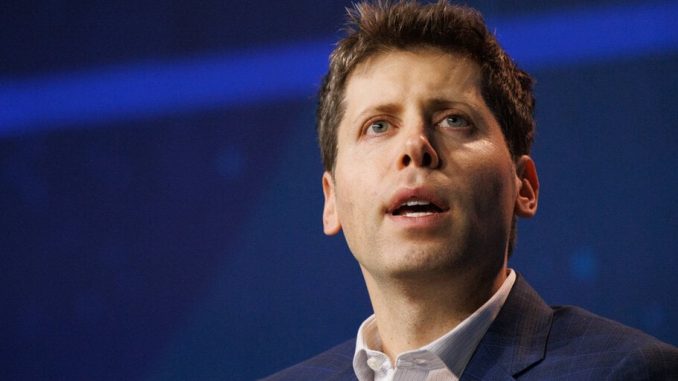
In an in-depth conversation with TV and film icon Oprah Winfrey on Thursday, OpenAI CEO Sam Altman shared his thoughts on artificial intelligence and what the future holds for the relationship between humans and computers.
In one of several interviews for Winfrey’s prime-time special “AI and the Future of Us,” Altman shed light on the transformative potential of this technology, as well as the critical challenges that developers and policymakers must address.
“Four years ago, most of the world, if they found out about AI, thought about self-driving cars or some other thing,” he told Winfrey. “It was only in 2022 when first-time people said, ‘Okay, this ChatGPT thing, this computer talks to me, now that’s new.’ And then since then, if you look at how much better it’s gotten, it’s been a pretty steep rate of improvement.”
Altman called AI the “next chapter of computing,” which allows computers to understand, predict, and interact with their human operators.
“We have figured out how to make computers smarter, to understand more, to be able to be more intuitive and more useful,” he said.
When asked to describe how ChatGPT works, Altman went back to basics, saying the core of ChatGPT’s capabilities lies in its ability to predict the next word in a sequence, a skill honed through being trained on large amounts of text data.
“The most basic level, we are showing the system 1,000 words in a sequence and asking it to predict what word comes next, and doing that again and again and again,” he explained, comparing it to when a smartphone attempts to predict the next work in a text message. “The system learns to predict, and then in there, it learns the underlying concepts.”
During the segment, Winfrey noted that a lack of trust led to a major shakeup at OpenAI in 2022. In November of that year, Altman was abruptly fired as CEO of OpenAI, with the board citing a lack of trust in Altman’s leadership—although he was reinstated a week later.
“So the bar on this is clearly extremely high—the best thing that we can do is to put this technology in the hands of people,” Altman said. “Talk about what it is capable of, what it’s not, what we think is going to come, what we think might come, and give our best advice about how society should decide to use [AI].”
“We think it’s important to not release something which we also might get wrong and build up that trust over time, but it is clear that this is going to be a very impactful technology, and I think a lot of scrutiny is thus super warranted,” he added.
One of the concerns raised during the interview was the need for diversity in the AI industry, with Winfrey pointing out that predominantly white males currently dominate the field.
“Obviously, we want everybody to see themselves in our products,” Altman said. “We also want the industry workforce to be much more diverse than it is, and there’s slower-than-we’d-like progress, but there is progress there,” he said, expressing a commitment to ensuring that the benefits of AI are accessible to all.
Altman also highlighted OpenAI’s collaboration with policymakers in developing safer artificial intelligence, saying that he speaks with members of the U.S. government—from the White House to Congress—multiple times a week.
Last month, OpenAI and Anthropic announced the establishment of a formal collaboration with the U.S. AI Safety Institute (AISI). In the agreement, the institute would have access to new models of ChatGPT and Claude from each company, respectively, prior to and following their public release.
Altman said collaboration between AI developers and policymakers is crucial, as well as safety testing of AI models.
“A partnership between the companies developing this technology and governance is really important; one of the first things to do, and this is now happening, is to get the governments to start figuring out how to do safety testing on these systems—like we do for aircraft or new medicines or things like that,” Altman said. “And then I think from there, if we can get good at that now, we’ll have an easier time figuring out exactly what the regulatory framework is later.”
When Winfrey told Altman that he’s been called the most powerful and perhaps most dangerous man on the planet, the CEO pushed back.
“I don’t feel like the most powerful person or anything even close to that,” he said. “I feel the opportunity—responsibility in a positive way—to get to nudge this in a direction that I think can be really good for people.”
“That is a serious, exciting, somewhat nerve-wracking thing, but it’s something that I feel very deeply about, and I realize I will never get to touch anything this important again,” Altman added.
Edited by Ryan Ozawa.
Generally Intelligent Newsletter
A weekly AI journey narrated by Gen, a generative AI model.

Be the first to comment